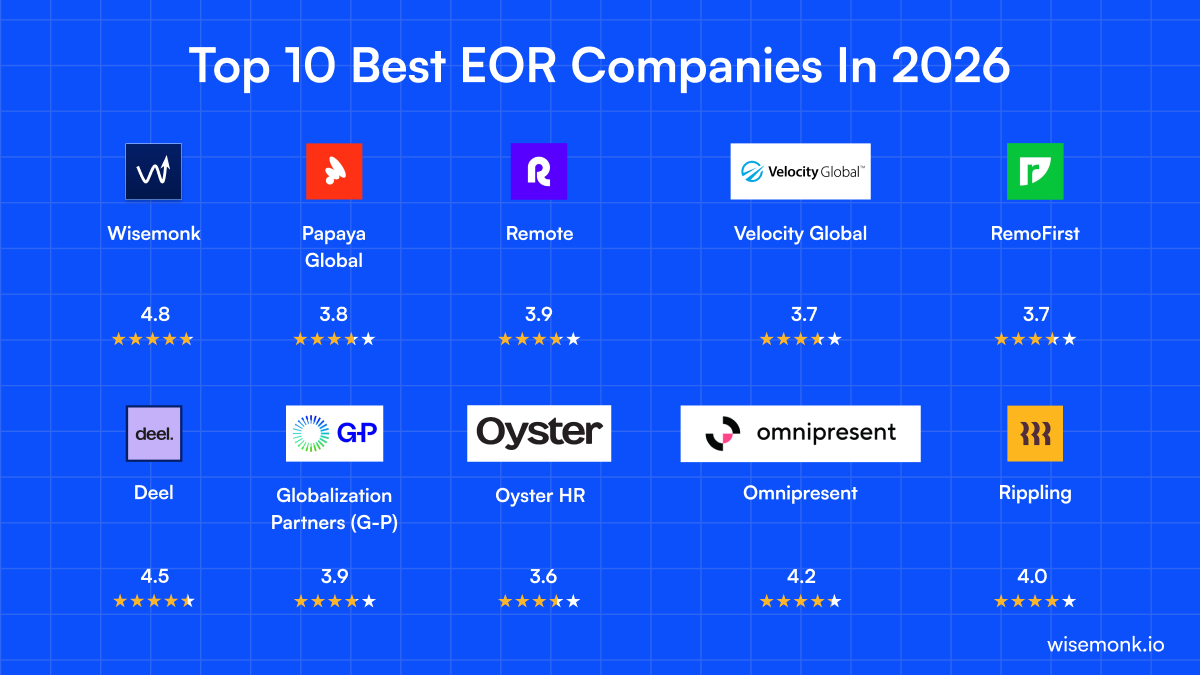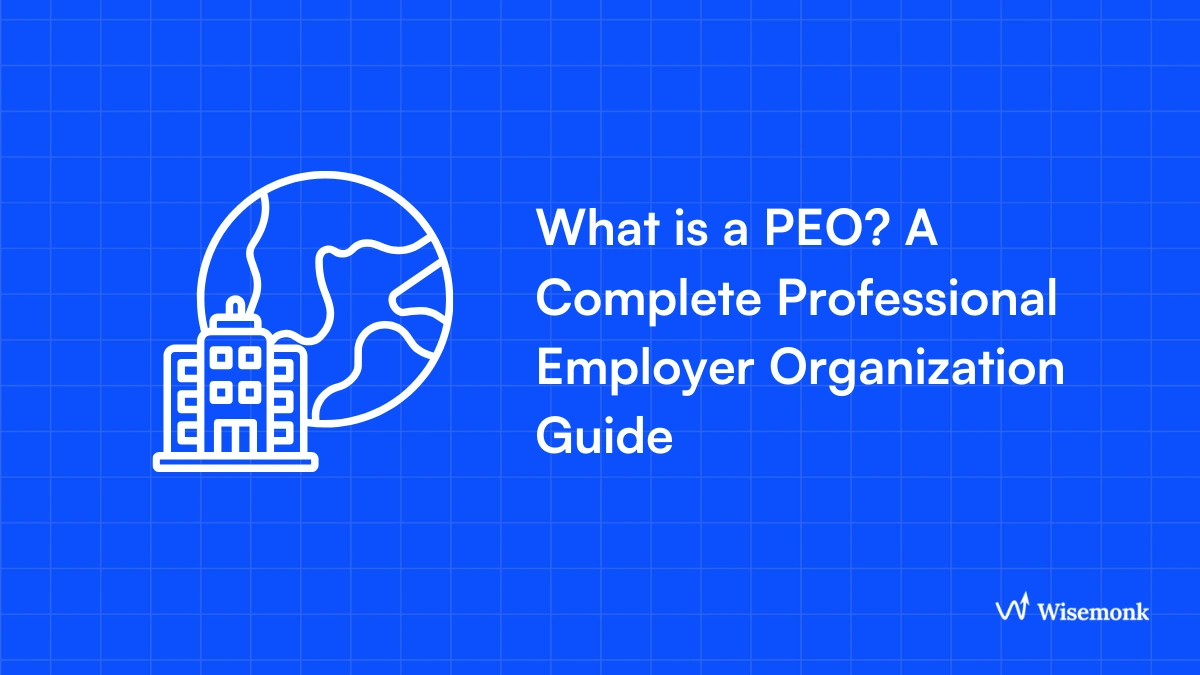- Outsourcing payroll services is the process of hiring external experts to manage salary processing, tax filings, compliance, and employee payments, saving time, reducing errors, and keeping your business compliant.
- The leading outsourcing payroll providers include Wisemonk, ADP, Gusto, Paychex, OnPay, TriNet, Rippling, Square Payroll, Remote, and Oyster that streamline salary processing, tax compliance, and employee management.
- The key reasons to outsource payroll are to streamline operations, reduce administrative workload, and strengthen compliance, helping businesses save time, minimize errors, enhance data security.
- The main steps to outsource payroll involve organizing employee data, selecting a scalable provider, and sharing key payroll and compliance details, followed by review and approval of payments each cycle.
Need help finding the right payroll solution? Contact us.
Discover how Wisemonk creates impactful and reliable content.
Looking for the right outsourcing payroll companies? You’re not alone. Many U.S. businesses and global teams struggle to find outsourced payroll services that are both reliable and compliant. Everyone promises “seamless payroll,” but few explain what makes a provider truly worth the switch.
The truth is, outsourcing payroll isn’t just about cutting admin work; it’s about staying compliant, scaling efficiently, and freeing up your team’s time to focus on real growth.
In this article, we’ll break down what payroll outsourcing really means, how to compare the top providers, and which companies stand out, so you can confidently pick a partner that gets payroll right every single time. Let’s get started.
What is payroll outsourcing?[toc=Payroll Outsourcing]
Payroll outsourcing means partnering with another company to handle all the tasks of paying your employees, calculating salaries, taxes, deductions, and filings, so you don’t have to.
It’s like having an expert team that ensures everyone gets paid correctly and on time, without your business juggling spreadsheets or tax codes.
Key Characteristics of Payroll Outsourcing:
- Third-party management: A specialized payroll company manages salaries, tax filings, and payslips on your behalf.
- Compliance assurance: They stay updated on changing labor and tax laws so you don’t make costly mistakes.
- Technology-driven: Most use cloud software that automates calculations, filings, and employee self-service portals.
- Scalable for growth: Works for both small teams and global companies hiring across multiple countries.
- Cost-efficient: Reduces the need for internal HR staff or accounting resources dedicated to payroll.
To learn how global payroll providers handle multi-country compliance, currency conversions, and employee payments worldwide, check out our guide on "What is International Payroll Outsourcing?".
Why should you outsource your payroll services?[toc=Why to Outsource]
Based on our experience helping global companies with payroll compliance solutions, here are the main reasons why outsourcing your payroll services can create smoother operations and stronger compliance control.
- Focus on core business: By removing payroll from your plate, you can redirect focus toward revenue-generating and strategic initiatives.
- Compliance made easy: Experts handle ever-changing tax, labor, and filing regulations so you stay fully compliant without constant monitoring.
- Reduced admin workload: Frees your human resources and finance teams from manual calculations, filings, and payment processing, allowing them to focus on strategy and employee experience.
- Fewer payroll errors: Automated systems ensure accurate salary, tax, and deduction calculations, minimizing costly mistakes.
- Time and cost efficiency: You save on payroll software, staff training, and accounting overheads while improving process accuracy.
- Improved data security: Reputed providers use encrypted systems and SOC 2–compliant processes to keep employee data safe.
Now that we’ve seen why outsourcing payroll makes sense, let’s take a closer look at how the leading outsourcing payroll companies stack up side by side, so you can identify which provider best fits your business needs.
Which are the top payroll providers to consider?[toc=Top 10 Payroll Providers]
Choosing the right outsourcing payroll company can be overwhelming, there are countless providers promising accuracy, compliance, and automation.
With our hands-on experience supporting companies in payroll management and compliance, we’ve identified the top payroll outsourcing companies that consistently deliver accuracy, reliability, and seamless operations for growing global teams.
- Wisemonk
- ADP
- Gusto
- Paychex
- OnPay
- TriNet
- Rippling
- Square Payroll
- Remote
- Oyster
If you’re planning to outsource your payroll, partnering with one of these leading providers can be a game-changer, ensuring compliance, reducing admin hassle, and letting your team focus on driving business growth.
1. Wisemonk
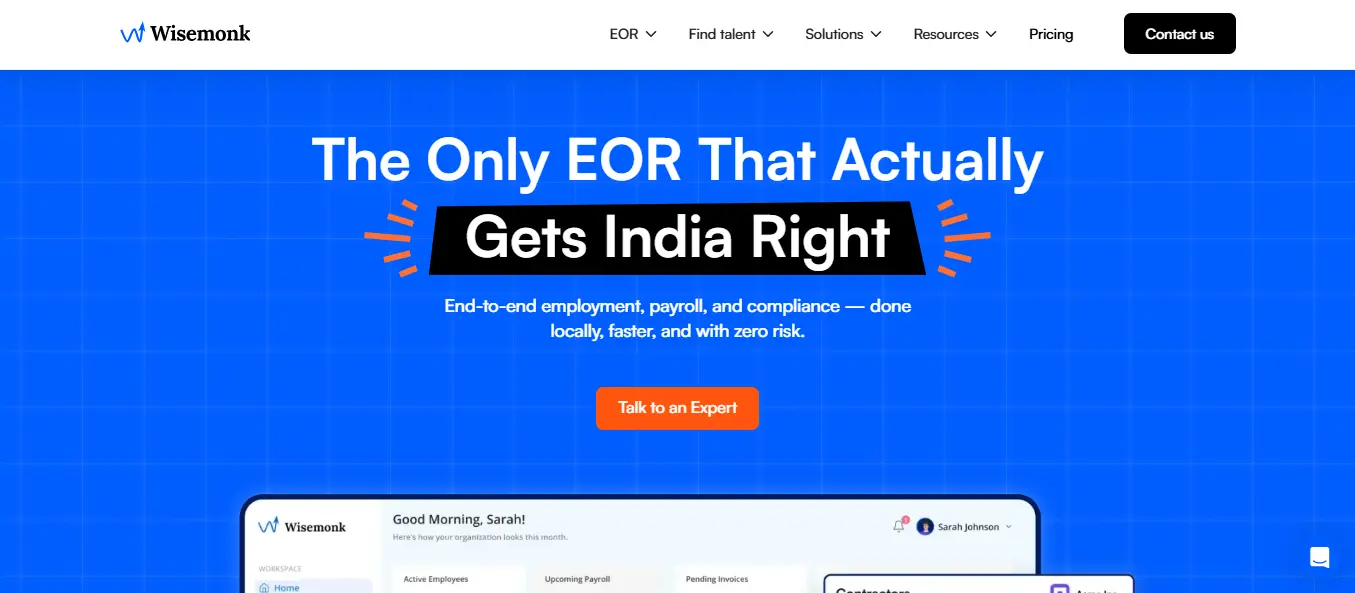
Wisemonk serves as an Employer of Record (EOR) and payroll outsourcing provider specializing in the Indian market. Its platform enables global businesses, particularly U.S.-based companies, to hire, manage, and pay employees in India without establishing a local entity.
The service integrates end-to-end payroll processing, statutory compliance, contractor management, and employee self-service capabilities with flexible benefits administration, making it well-suited for startups and expanding global teams seeking compliant, hassle-free growth in India.
Key Features
- Complete EOR and payroll management
- Deep local compliance expertise in India
- Employee self-service dashboards
- Flexible benefits and reimbursement administration
- Contractor payroll and payments
- Integrations with major accounting tools
- Real-time analytics and payroll reporting
Pros & Cons
Pricing
- EOR services: Starting at $99 per employee/month
- Contractor payments: $19 per contractor
- Custom plans: Available for larger teams and enterprises
- All statutory filings are included in the package, ensuring transparent, predictable costs with no hidden fees.
2. ADP
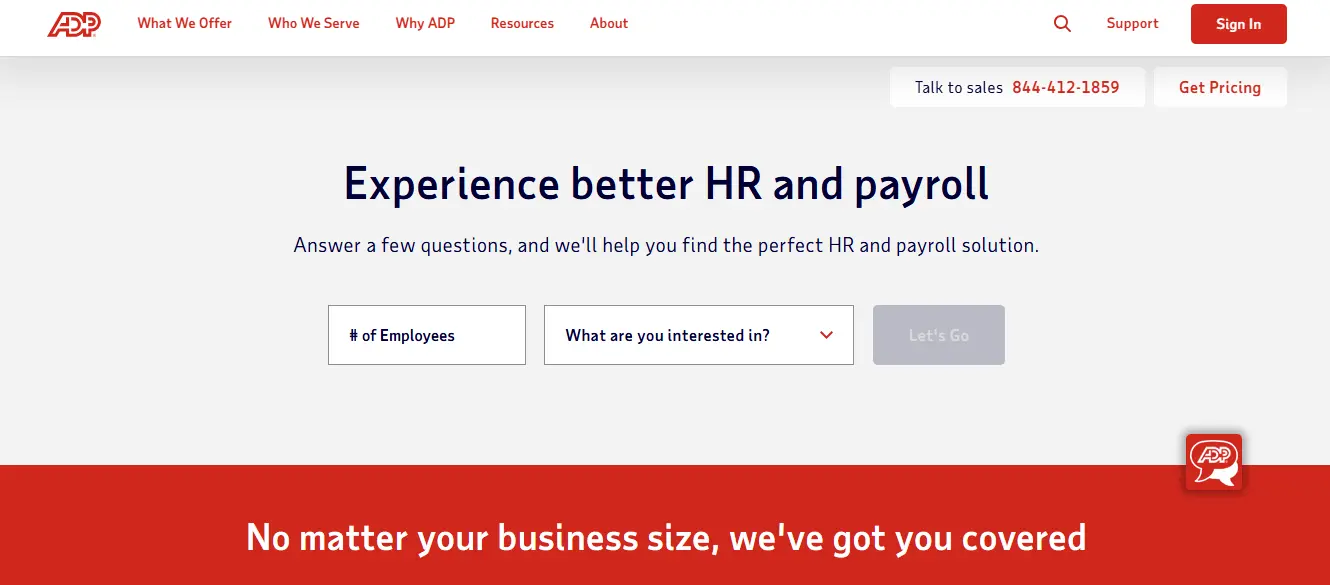
ADP is a global leader in payroll and HR outsourcing, serving clients with more than 75 years of expertise. They offer end-to-end payroll, tax, and compliance management with strong multi-country capabilities and provides enterprise-grade outsourced payroll services with built-in compliance and reporting tools.
Key Features
- End-to-end payroll processing and tax management
- Built-in compliance monitoring for statutory filings
- Real-time cloud-based payroll access
- Employee and manager self-service dashboards
- Integrations with major accounting and HR platforms
- Multi-country payroll and global reporting
- Mobile app for payroll management and access
- Dedicated support and implementation assistance
Pros & Cons
Pricing
ADP follows a customized pricing model, tailored to business size, location, and service scope. Costs are typically calculated on a per-employee-per-month (PEPM) basis.
3. Gusto
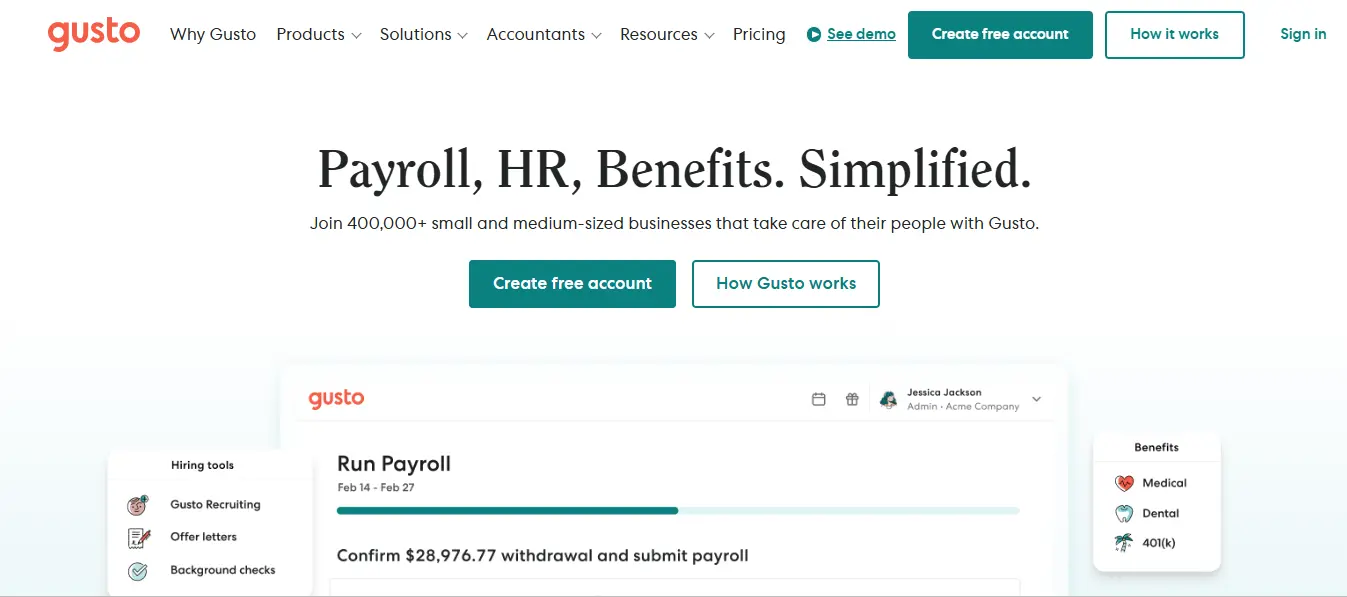
Gusto offers an all-in-one cloud platform that simplifies payroll, benefits, and HR management for small and mid-sized businesses. They automate payroll runs, tax filings, and compliance while integrating with key business tools. Ideal for teams seeking automation and simplicity in payroll operations.
Key Features
- Unlimited payroll runs and automatic tax filings.
- Integrated payroll + benefits + HR tools (medical, 401k, PTO tracking).
- Accounting software integrations (QuickBooks, Xero), mobile app, and employee self-service.
- Time-tracking, offline/bonus payroll runs, cloud access from anywhere.
Pros & Cons
Pricing
- Simple Plan: $49/month + $6/person/month.
- Plus Plan: $80/month + $12/person/month.
- Premium/Custom Plan: Custom pricing for larger teams and more advanced features.
4. Paychex
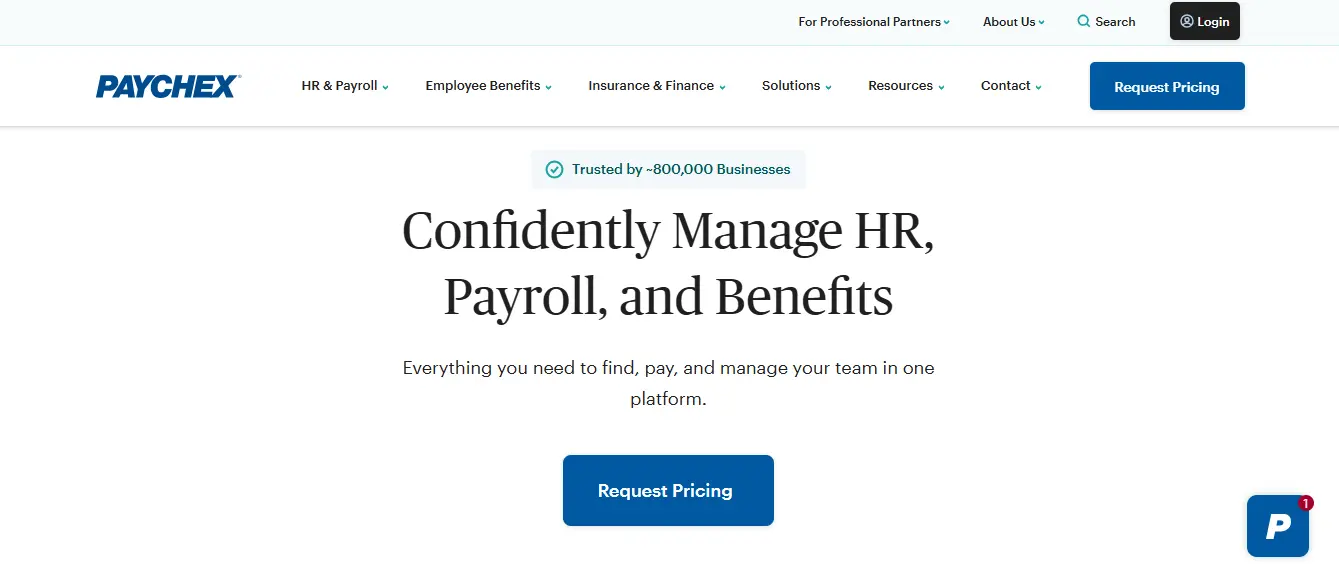
Paychex provides full-service payroll and HR solutions to businesses of all sizes. They support payroll processing, tax administration, compliance, and HR workflows through their platform. They’re built to scale from small businesses to large enterprises.
Key Features
- Full-service payroll with automated tax filing and compliance.
- Mobile and desktop access for payroll submission and approvals.
- Employee self-service and flexible payment options (direct deposit, pay-on-demand).
- Scalable support for small to enterprise businesses with multi-state compliance.
Pros & Cons
Pricing
- Entry-level plan starts at $39/month + $5 per employee/month for small businesses.
- Higher tiers (e.g., “Flex Select”, “Flex Pro”, enterprise packages) use custom pricing, requiring quote request. Note: Actual cost depends on employee count, payroll frequency, add-ons (benefits, modules) and region.
5. OnPay
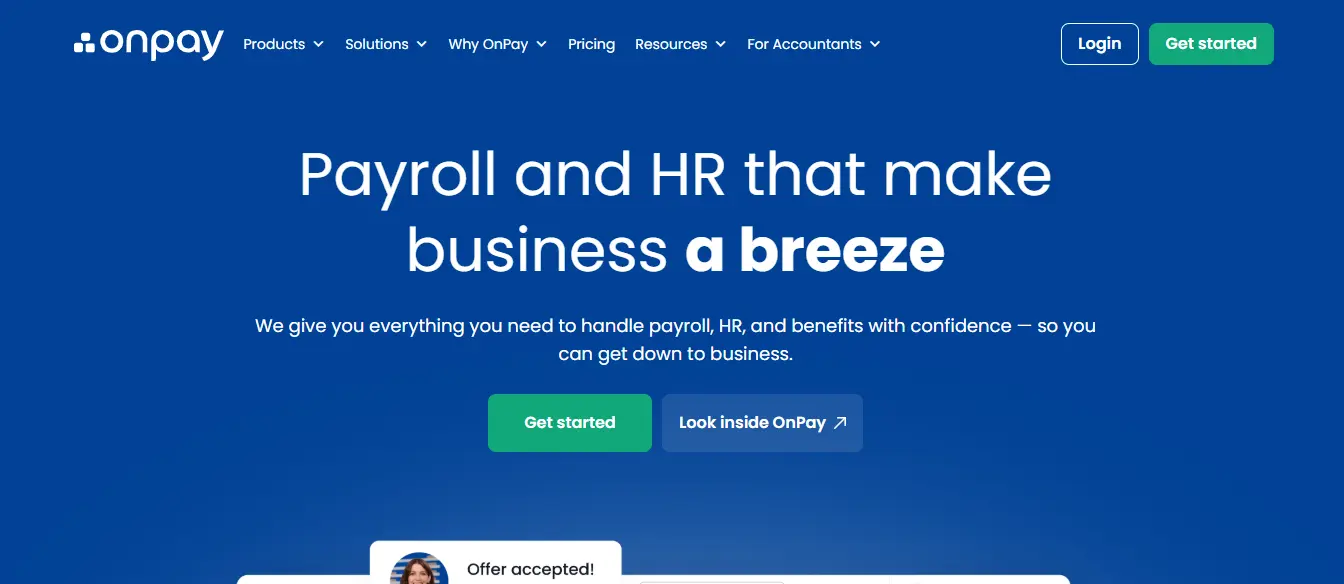
OnPay offers a cloud-based payroll and HR platform that simplifies pay runs, tax filings, and compliance for small to mid-sized businesses. With transparent pricing and unlimited pay runs, it's designed to reduce back-office burden and let business owners focus on growth.
Key Features
- Unlimited payroll runs, including W-2 and 1099 workers.
- Automated federal, state and local tax filings and payments.
- Employee self-service portal, onboarding workflows, and integrated HR tools.
- Transparent pricing: $49/month base fee + $6 per person.
- “No hidden fees” policy including migration/setup support.
Pros & Cons
Pricing
- Base fee: $49/month + $6 per person/month.
- Pricing includes unlimited pay runs, tax filings, and support in the U.S.
6. TriNet
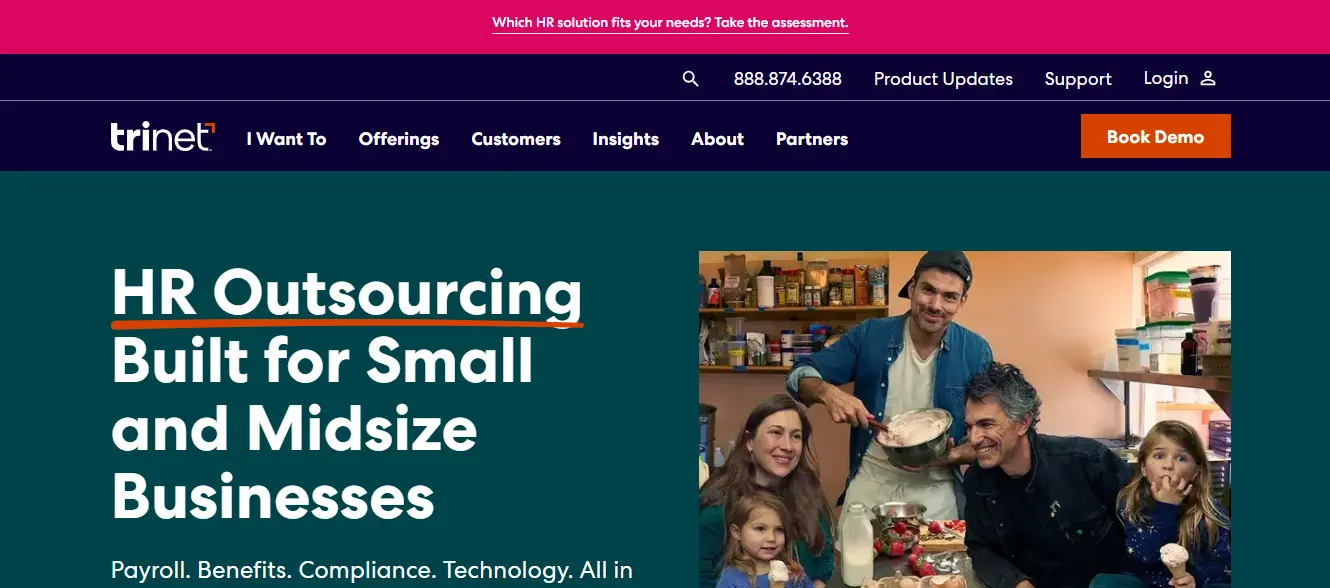
TriNet offers full-service payroll, HR, compliance and benefits solutions via its PEO and HR Plus model, designed for small to mid-sized U.S. businesses seeking outsourced people-operations support.
Key Features
- Unlimited payroll runs, direct deposits, electronic pay stubs and mobile access.
- Integrated compliance and tax-filing support for federal, state & local requirements.
- Self-service portals and time/attendance integration synced with payroll.
- Unified HR platform covering onboarding, benefits admin, analytics and mobile access.
Pros & Cons
Pricing
- TriNet does not publicly disclose specific pricing. The company offers customized quotes based on business size, number of employees, industry, and selected service packages.
- Pricing typically follows a per-employee-per-month (PEPM) model, with costs varying depending on whether businesses choose the full PEO solution or HR Plus services.
7. Rippling
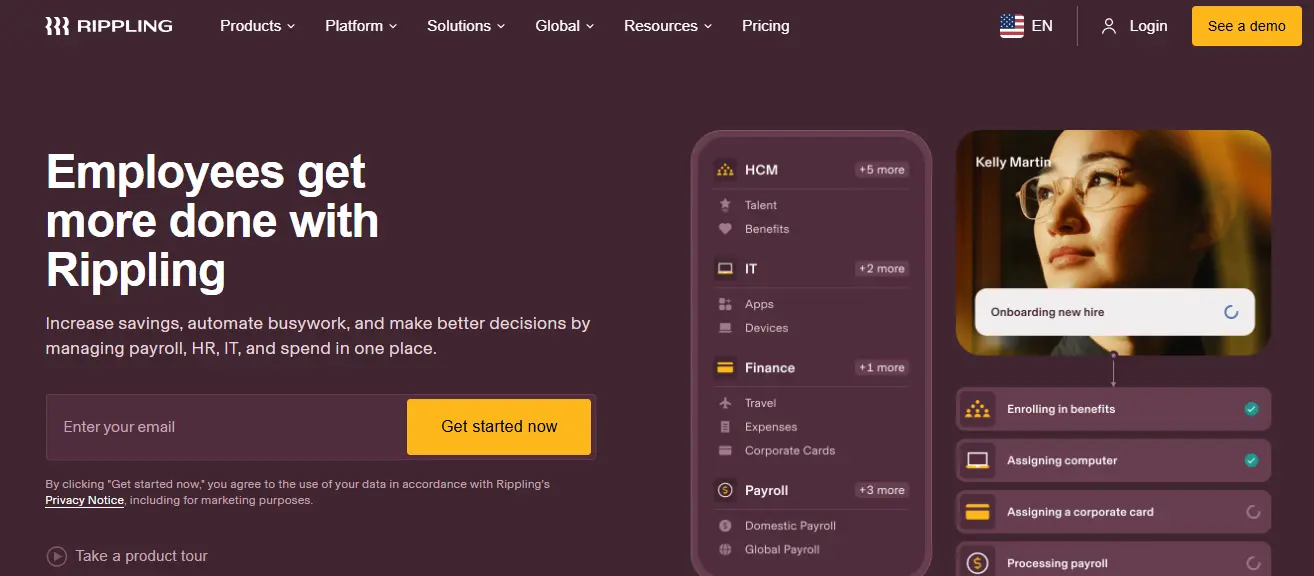
Rippling offers a unified cloud platform that brings payroll, HR, IT, and spend management into one system, ideal for businesses managing domestic and international teams. They specialize in automating global payroll, tax-filing, device/app provisioning, and compliance.
Key Features
- Full payroll processing including tax filings and multi-country support.
- Single platform integration across HR, IT, and finance (employee onboarding, device/app access, spend management).
- Global compliance automation and multi-currency payroll capabilities.
- Employee self-service portal and mobile access.
Pros & Cons
Pricing
- Entry-level payroll service: starting at $8 per employee/month.
- Modular pricing model: cost increases with additional modules (HR, IT, global payroll, EOR).
- To get full pricing based on business size and module selection, a custom quote is required.
8. Square Payroll
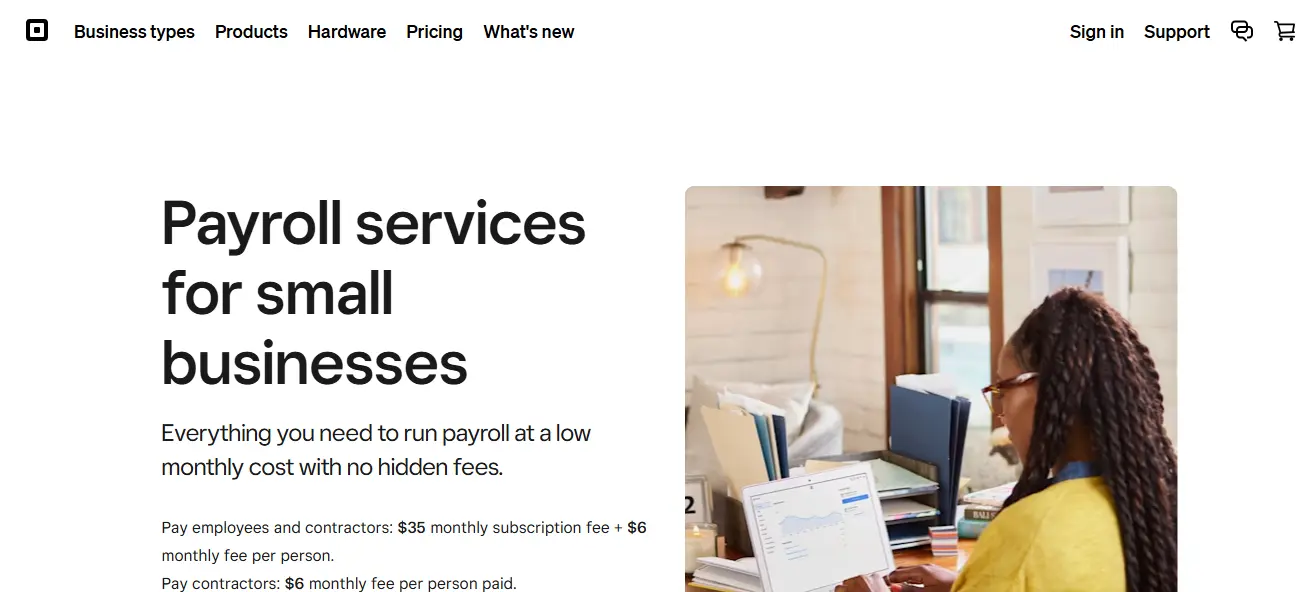
Square Payroll is a full-service payroll solution designed primarily for small U.S. businesses, whether paying W-2 employees or 1099 contractors, and integrates seamlessly with Square’s wider ecosystem of POS, time tracking, and business tools.
Key Features
- Unlimited payroll runs with full tax filing (federal & state) included.
- Contractor-only payment plan for 1099 workers with simplified fee structure.
- Time tracking, tips/commissions input, mobile app access and POS integration.
- Quick onboarding and transparent billing with no long-term contracts.
Pros & Cons
Pricing
- Full-Service Payroll (employees + contractors): $35/month + $6/month per person paid.
- Contractor-Only Payroll: $6/month per person paid, no base fee.
9. Remote
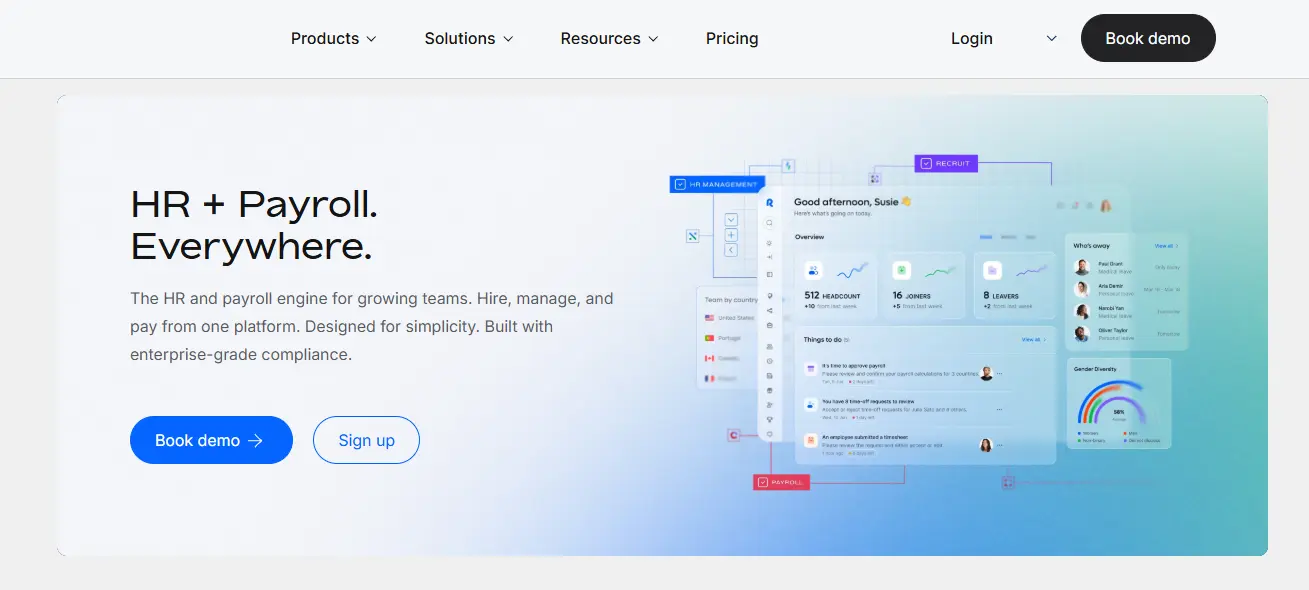
Remote is a global payroll, HR, and EOR platform built for companies hiring international teams. They offer services that let businesses handle payroll, compliance, and benefits across borders without setting up a local legal entity.
Key Features
- Global payroll and compliance in 90+ countries.
- Unified platform for onboarding, benefits, and payments.
- Transparent per-employee pricing and easy scaling.
- Dedicated onboarding and local compliance support.
- Integrations with major HR and finance tools.
Pros & Cons
Pricing
- Payroll only: from $29 per employee/month.
- Employer of Record (EOR): starts at $599 per employee/month (annual) or $699 per employee/month (monthly).
- Contractor Management: from $29 per contractor/month, with a “Plus” plan at ~$99 per contractor/month.
10. Oyster
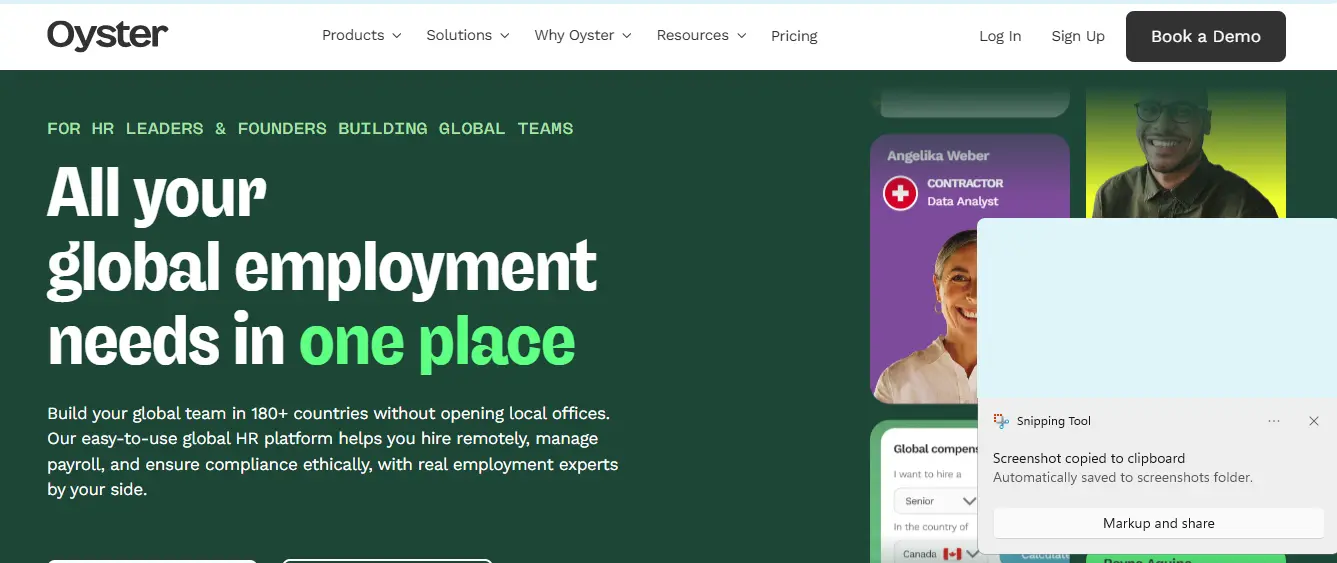
Oyster is a global employment platform that enables companies to hire, pay, and manage employees and contractors in 180+ countries without needing local entities. It streamlines payroll, HR, and compliance for distributed teams.
Key Features
- Contractor & full-time hiring in 180+ countries.
- Multi-country payroll in 140+ currencies.
- Global compliance, employment contracts, and benefits administration.
- Unified platform with onboarding, pay, time-off, and cost reporting.
Pros & Cons
Pricing
- Contractor plan: USD 29/month per contractor after a 30-day free trial.
- Global Payroll plan: Starting at USD 29/month per employee.
- Employer of Record (EOR) plan: USD 699/month per employee on month-to-month billing.
If you’re looking to explore leading payroll outsourcing providers in India, check out our guide on "Top 10 Payroll Outsourcing Services in India for 2025".
How do the top payroll outsourcing providers compare?[toc=Cost Comparison]
With our hands-on experience helping companies with payroll, and compliance operations, here’s how the top payroll outsourcing providers compare so you can identify the best partner for your business goals.
If you’re looking to dive deeper into payroll pricing, cost savings, and model comparisons, check out our detailed guide on "Payroll Services Cost Comparison 2025: The Ultimate Guide''.
How do I choose the right payroll service provider?[toc=Choose Right Payroll Provider]
Having worked closely with global businesses on payroll, compliance, and people operations, we know what really matters when selecting a payroll outsourcing partner.
Here are the key considerations when choosing a payroll service provider:
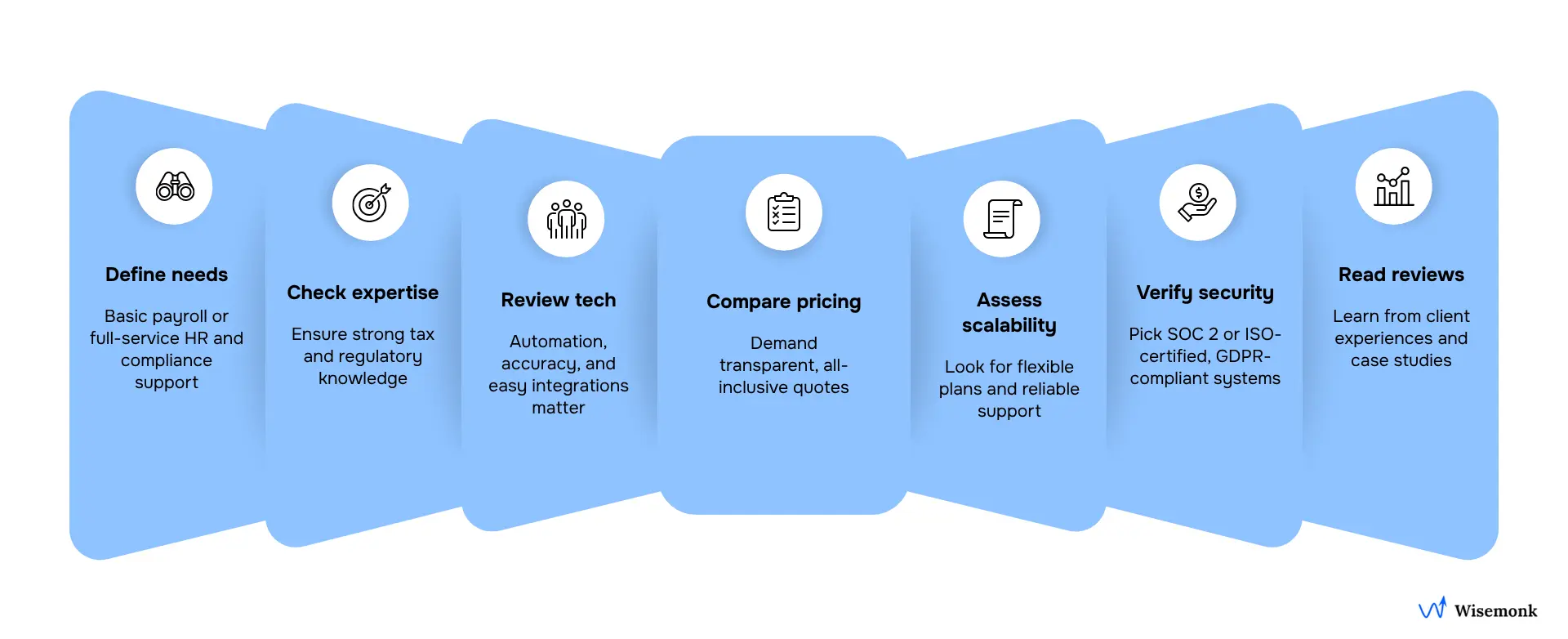
- Identify your payroll needs and complexity: Start by defining what you actually need, full-service payroll, HR and benefits administration, or just tax filing. Small business owners may need basic payroll processing, while global companies might require a complete payroll outsourcing solution with compliance across multiple countries.
- Evaluate payroll compliance and tax expertise: The right provider should handle federal, state, and local tax filings, including annual payroll tax reporting and employee deductions. Look for companies with proven experience in handling employment taxes, benefits administration, and complex payroll tasks.
- Check software capabilities and integrations: Choose a payroll software that automates calculations, manages payroll data securely, and integrates with accounting or HR tasks. Automated payroll tools reduce payroll errors and streamline employee onboarding.
- Compare pricing and transparency: Always request a clear breakdown of the outsourcing payroll cost. Compare outsourcing payroll costs, setup fees, and add-ons like benefits or retirement plan contributions. Avoid providers that hide charges under “service fees.”
- Assess customer support and scalability: Your business may grow, your payroll solution should too. Look for providers that offer dedicated payroll specialists, flexible payroll frequencies, and 24/7 support. Ask about service-level agreements and turnaround times for issue resolution.
- Review compliance certifications and data security: Payroll involves sensitive employee data, tax withholdings, and payment details. Prioritize providers with SOC 2 or ISO-certified payroll systems, encrypted data storage, and GDPR compliance for global payroll operations.
- Read reviews and ask for references: Before finalizing, review case studies or customer stories to see how the provider handles complex payroll situations and compliance challenges. This helps confirm reliability and ongoing support quality.
By considering these factors, you can choose a payroll provider that fits your business needs and enhances overall efficiency. The right partner will simplify payroll management, reduce compliance stress, and let you focus on scaling your business with confidence.
How to outsource payroll?
Leveraging our expertise in payroll, compliance, and people operations, we’ve broken down how the outsourcing payroll duties and what to expect at each stage.
1. Get Your Data Organized
- Start by gathering all your employee details, contracts, pay rates, tax IDs, and attendance records. Having everything in one place makes things easier down the road.
- Make sure all the information is up to date. This way, you won’t run into issues when it’s time to process payroll.
2. Analyze Payroll Outsourcing Companies
- Don’t just go for the cheapest provider. Look for one that can handle your growing business, especially if you're planning to expand globally.
- Make sure they have experience with the regions where you operate, so you can stay compliant no matter where your team is based.
3. Share Key Employee Information
- During setup, give your provider all the important details like Tax IDs, pay rates, deductions, and any garnishments.
- If your provider doesn’t offer time and attendance tracking, make sure your current system works smoothly with theirs to avoid any data hiccups.
4. Hand Off Compliance Data
- If your provider is managing taxes and filings, make sure they have all the necessary compliance data, like tax rates and contributions.
- It’s key to make sure they’re up to speed on local labor laws and tax regulations so everything is filed correctly.
5. Approve Payments
- After the provider calculates the wages and deductions, take a moment to review the numbers before giving your approval.
- Double-check everything to ensure there are no mistakes before salaries are deposited into employee accounts.
6. Review Reports Regularly
- Every payroll cycle, you should get detailed reports. Take time to review them to keep an eye on your costs and benefits.
- Use these reports to make sure you’re compliant and to spot any trends or discrepancies in your payroll.
For founders, outsourcing payroll isn’t just about saving time, it’s about peace of mind, knowing compliance is handled, employees are paid on time, and the system can scale as the company grows.
What are the benefits of outsourcing your payroll services?[toc=Benefits of Outsourcing]
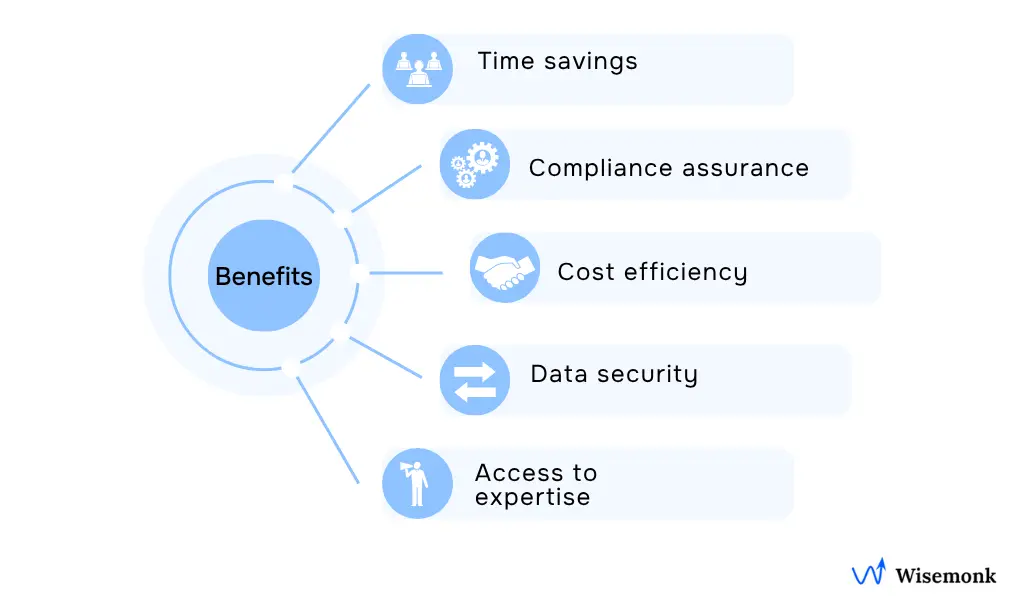
Having guided companies through payroll outsourcing and compliance management, here are the core benefits that make outsourcing a smarter business decision.
- Time savings: Outsourcing payroll streamlines payroll processing, tax filings, and compliance tasks, freeing HR teams to focus on core business goals.
- Compliance assurance: Payroll providers stay up to date with federal taxes, state, and local tax laws, reducing the risk of penalties and payroll errors.
- Cost efficiency: Eliminates the need for in-house payroll staff, software maintenance, and error correction costs, lowering overall payroll expenses.
- Data security: Leading payroll outsourcing companies use advanced encryption and secure systems to protect sensitive employee and payroll data.
- Access to expertise: Experienced payroll specialists handle complex payroll functions and employee deductions with precision and consistency, improving accuracy, employee benefits administration like health insurance, and overall employee satisfaction.
You may also want to explore how in-house payroll compares to outsourcing. Check out our detailed guide on “In-House Payroll vs Outsourcing: Key Differences Explained.”
How can Wisemonk help in payroll processing?[toc=Why Choose Wisemonk]
Wisemonk serves as a trusted Employer of Record (EOR) in India, enabling global companies to hire, pay, and manage employees without local entity setup. With our deep understanding of local employment laws, tax compliance, and cross-border workforce management, we enable businesses to expand quickly while staying compliant and efficient.
Let us show you what we deliver:
- Accurate Salary Calculations: We manage salary calculations, overtime, bonuses, and reimbursements, ensuring every employee, whether full-time or contractor, gets paid on time, every time.
- Reliable Compliance Management: We keep pace with evolving Indian labor regulations, ensuring full compliance and zero penalty risks.
- Employee Self-Service Access: Transparent, user-friendly portals give employees instant access to payslips, tax forms, and essential documents.
- Flexible & Scalable Payroll: Designed to adapt as your business expands, our payroll solutions fit startups and global enterprises alike.
While India is our core strength, we’re expanding rapidly into key global markets such as the United States, the United Kingdom, and beyond. With Wisemonk, you get a reliable payroll services provider for your India operations and your broader global hiring journey.
Ready to simplify payroll? Let Wisemonk handle your outsourced payroll services so you can focus on growing your business with confidence. Contact us today.
Frequently asked questions
What are three disadvantages of outsourcing?
Outsourcing can limit your control over daily operations and decision-making. It also introduces potential data security risks since sensitive employee information is shared externally. In some cases, hidden or variable costs may arise if pricing structures aren’t clearly defined upfront. These factors make provider selection critical.
What are the three types of payroll?
The main types of payroll are manual, in-house, and outsourced. Manual payroll uses spreadsheets and is prone to errors, while in-house payroll relies on software managed by internal HR teams. Outsourced payroll is handled by a third-party provider or Employer of Record (EOR) that manages salaries, tax filings, and compliance.
What HR functions should not be outsourced?
Strategic HR functions like leadership development, culture building, and employee engagement should stay in-house. These areas require deep understanding of the company’s people and long-term goals. Administrative tasks such as payroll or compliance, however, can be outsourced for efficiency and scalability.
What is better, QuickBooks or ADP?
QuickBooks is ideal for small businesses seeking affordable, easy-to-use payroll integrated with accounting tools. ADP suits larger organizations with complex payroll, compliance, and HR needs. For companies planning to expand globally, ADP’s broader coverage and automation capabilities make it the better fit.
What is the typical cost structure for payroll outsourcing?
Payroll outsourcing generally follows a per-employee-per-month (PEPM) pricing model, where costs depend on company size, service scope, and location. For example, basic payroll processing may cost $20–$50 per employee per month, while full-service solutions with compliance, benefits, and tax management can go up to $100+.
How do payroll services reduce operational costs compared to in-house management?
Understanding the outsourcing payroll cost versus in-house management helps businesses see the true savings from automation, compliance support, and reduced staffing needs. Providers automate calculations, filings, and tax updates, reducing manual effort, minimizing errors, and preventing costly penalties while strengthening risk management and ensuring timely submissions to relevant government agencies.
Is outsourcing payroll a good idea?
Yes, because payroll outsourcing reduces payroll errors, improves payroll accuracy, and keeps you compliant with tax laws. For small business owners, outsourcing frees time to focus on core business activities.
.webp)
